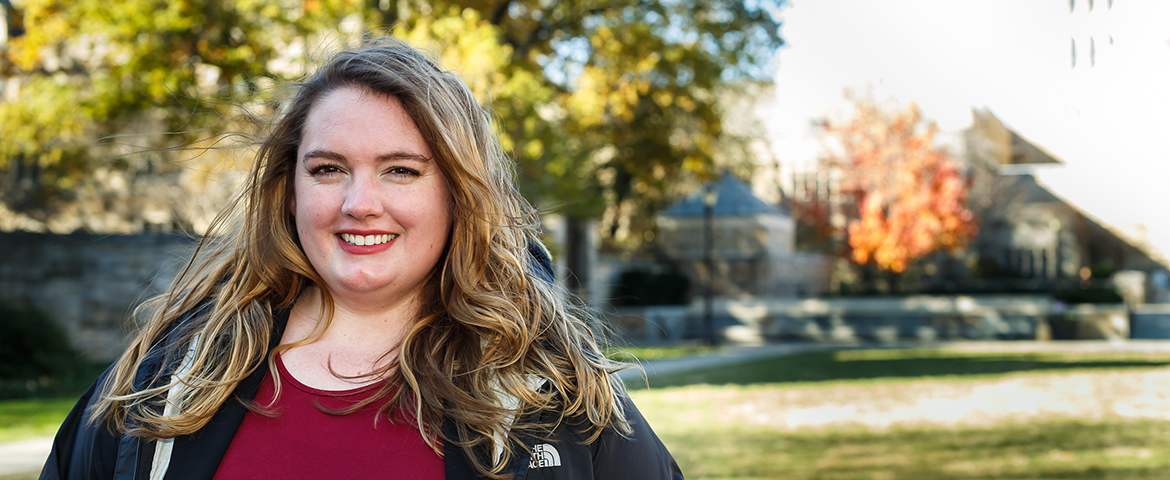Passion for solving unanswered questions drives PLU alum’s research career

Image: PLU alumna SarahAnn McFadden ’11 is a post-doc researcher at the Yale Institute for Global Health, studying child vaccination rates. (Photo courtesy of Tony Fiorini)
By Ernest Jasmin
Marketing & Communications
TACOMA, WASH. (Dec. 24, 2019) — Research has become Pacific Lutheran University grad SarahAnn McFadden’s life. This year, McFadden ‘11 landed a position as a postdoctoral associate at the Yale Institute of Global Health in New Haven, Connecticut, where she spends her time analyzing factors that have caused child vaccination rates to decline in many parts of the country.
Not that poring over such data was always her forte. Her passion was kindled years ago as a psychology undergrad at PLU — even if she had to overcome her initial dread of statistics and methods first.
“I was terrified to take that class because I never considered myself to be good at math,” the 31-year-old Lakewood native said. “I didn’t think I would be very successful. But it really grounded within me a passion for trying to answer questions that haven’t been answered yet.”
McFadden’s aptitude and enthusiasm stood out to the point that professor Jon Grahe brought her back as a teaching assistant the following year. “That’s a course that most students just hate,” Grahe said. “So when you have a student that does well … you really want them for a TA. There were a lot of little things about her that really hinted at this love for research that she has continued on with.”
After a bit of soul-searching, McFadden decided to pursue a career in nursing instead of psychology, and she enrolled at John Hopkins University where she earned a master’s degree in 2012.
She was hired by Seattle Children’s Hospital soon after, followed by a stint at the University of Washington’s Pediatric Care Center. It was there that a frustrating discussion with a young patient’s mother put her on her current path.
The woman had been reading about vaccines on the Internet, and she was worried that they might be harmful to her child. McFadden’s need to convince her otherwise went beyond her professional obligation; her aunt and uncle wore leg braces and needed crutches thanks to polio, a disease they had contracted in the early 1950s before the introduction of Jonas Salk’s vaccine.
“It was a really challenging conversation,” McFadden recalled. “I firmly believe that parents who are concerned about vaccines are coming, most of the time, from a good place. But the risk that’s associated with those vaccine-preventable diseases is not as visible nowadays. Then, on top of that, there is a great deal of misinformation on the Internet.”
The incident was a catalyst for her returning to school again. She enrolled at the University of Washington, where she earned a Ph.D. in Nursing Science this year. “The reason I went back is I wanted to be able to look at vaccines in a different way to provide better patient education and better education in the community,” she said.
McFadden put the research skills she honed at PLU to good use, writing her dissertation on variations in county-level toddler immunization rates, a topic she continues to explore at the Yale Institute of Global Health. She also assists the center’s director, Saad Omer, on projects that examine the impact of immunization policy changes on vaccination rates, vaccine hesitancy among health care workers in low-resource countries, and the ethics of changing dosing schedules for the human papillomavirus vaccine.
The transition from her graduate studies to her current project work has been quite challenging, but it is a challenge she enjoys. “I think it’s going to be pretty similar when I make the transition from postdoc to faculty,” she said. “But I feel like I was exposed to enough at PLU, at Hopkins, through nursing, all of it, to where I have the skills and background to make my way on any new path.”
Her mentor agreed. “In terms of my 25 years in academia, she’s in the top tier of student performance,” Grahe said. “I could see her at a Tier 1 research-focused school where she teaches maybe two classes a year, and the rest of the time does research. I could see her running a nursing ward as an administrator someday, or running a school where other people are learning how to be a teacher. She’s brilliant to start with. Wherever she goes, I think she’ll be successful.”


